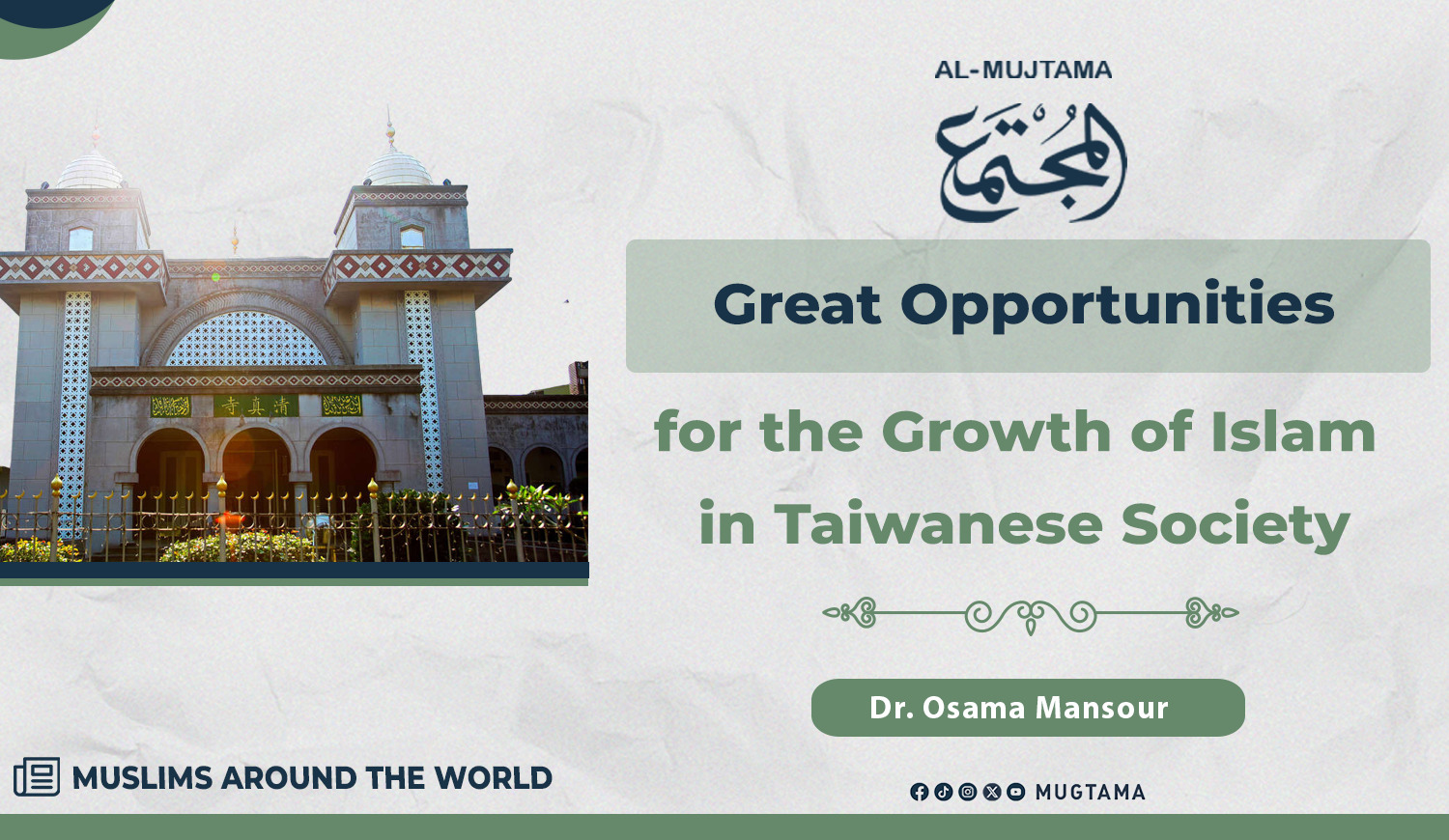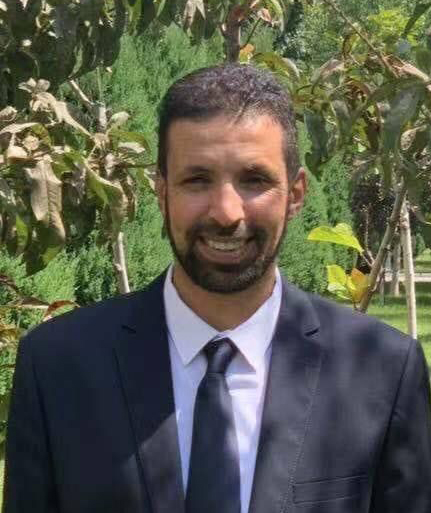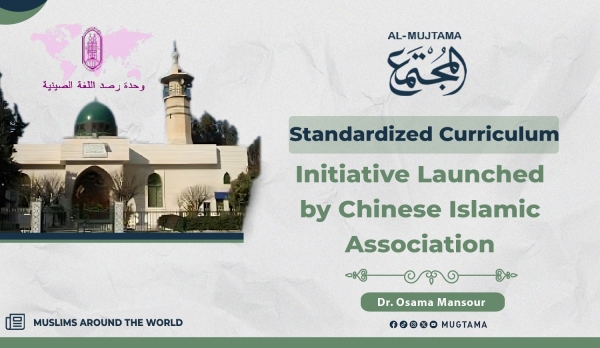Sheikh Yasser Cheng, Chairman of the Board of Directors of Taipei Grand Mosque in Taiwan, to "Al-Mujtama":
Great Opportunities for the Growth of Islam in Taiwanese Society

Islam in Taiwan: An Overview
Taiwan is considered one of the scientifically and
technologically advanced countries, enjoying widespread fame among the nations
of the world. It is also a distinguished tourist destination for travel
enthusiasts. However, the question that arises is: what is the state of Islam
in Taiwan? How many Muslims are there? Do they have mosques or Islamic
institutions? And other questions that concern every Muslim.
An Interview with Sheikh Yasser Cheng
In this dialogue with Sheikh Yasser Cheng, Chairman of the
Board of Directors of Taipei Grand Mosque in Taiwan, we will get closer to
examining the conditions of Islam and Muslims in this country.
Introducing Sheikh Yasser Cheng Interviewer:
Could you please introduce yourself
to the readers?
Sheikh Yasser Cheng: My name
is Yasser Cheng, Chairman of the Board of Directors of the Taipei Grand Mosque
Foundation. This position is voluntary. I am originally a professional diplomat
and converted to Islam in Riyadh, Saudi Arabia, when I was twenty-five years
old. Thirty-seven years have passed since my conversion to Islam until today.
The Connection Between Diplomacy and Mosque
Leadership Interviewer:
What is the relationship between
being a diplomat and taking responsibility for the Taipei Grand Mosque?
Sheikh Yasser Cheng: Yes,
this is a common practice in Taiwan. Any Islamic figure who has prior official
relations with Arab and Islamic countries can hold religious positions within
the Muslim community in Taiwan. This is to benefit from their experience in
cooperating with Arab countries in ways that benefit Muslims in Taiwan.
Previously, the renowned Sheikh and diplomat Ayub Ting Chung Ming (1913-2005)
served as the Chairman of the Board of this mosque and the head of the Hajj
delegation for Taiwanese Muslims for many years, despite being a diplomat who
spent many years as an ambassador in several Arab countries.
A General Look at Islam in Taiwan Interviewer:
Can you give us an overview of Islam
in Taiwan?
Sheikh Yasser Cheng: The
local Muslim community in Taiwan was formed during several historical periods,
witnessing migrations from Chinese Muslims and Southeast Asian Muslims.
However, the largest of these migrations occurred after the Communist Party
took power in China, when more than 20,000 Muslims moved from China to Taiwan
with the Republic of China government in 1949. According to data from the
"Chinese Muslim Association," the number of Muslims in Taiwan is said
to be 300,000. However, the truth is that this number is exaggerated. In my
personal estimation, the real number is much lower, and 99% of the Muslims here
are foreigners, most of them from Indonesia.
Key Islamic Institutions in Taiwan Interviewer:
What are the most important Islamic
institutions in Taiwan?
Sheikh Yasser Cheng: In fact,
there are no truly strong Islamic institutions in Taiwan. For example, the
Chinese Muslim Association is considered the official religious body, but in
recent years it has lost many of its advantages, especially after politics
overshadowed most of its duties. There is insistence among the Muslim community
in China on the necessity of reform, and it is becoming close. Also, the Taipei
Grand Mosque is considered the most serious institution in the field of Da'wah
(invitation to Islam) and education. In this mosque, an average of one or two
people convert to Islam weekly.
In addition to that, there is another institution, the
"Taiwan Halal Integrity Development Association," which was opened in
May 2011 in Taipei and obtained membership in the Cross Border Halal Food
Certificates Program supervised by Indonesia, Malaysia, Singapore, and
Malaysia. The association's headquarters are located in the Taipei Cultural
Mosque.
Functions of the Taipei Grand Mosque Beyond Prayer Interviewer:
Does the Taipei Grand Mosque have
functions other than prayer and worship?
Sheikh Yasser Cheng: Yes, the
Taipei Grand Mosque, built in the 1960s, is the largest mosque in the capital
and the largest mosque in the country. It is similar in size to the Tokyo Grand
Mosque in Japan. In addition to being a major place of worship for Muslims in
Taipei, it also plays an important diplomatic role. Officials and visitors from
Islamic countries come to it, and the mosque also assumes responsibilities in
the fields of Da'wah, education, and tourism.
Number of Mosques in Taiwan Interviewer:
How many mosques are there in
Taiwan?
Sheikh Yasser Cheng: There
are currently 16 mosques in Taiwan and more than 100 small prayer rooms. Many
universities, tourist sites, and high-speed train stations also contain prayer
rooms for Muslims. The Taipei Grand Mosque is the oldest and most famous, along
with a number of other well-known mosques such as the Kaohsiung Mosque in
Lingya District, the Taipei Cultural Mosque in Zhongzheng District, and the
Taichung Mosque in Nantun District, etc.
Major Religious Activities for Muslims in Taiwan Interviewer:
What are the most important
religious activities for Muslims in Taiwan?
Sheikh Yasser Cheng: Muslims
in Taiwan usually celebrate all religious occasions, but their most important
activities are during the two Eids: Eid al-Fitr and Eid al-Adha.
Prominent Islamic Figures in Taiwan Interviewer:
Who are the most prominent Islamic
figures in Taiwan?
Sheikh Yasser Cheng: The
Muslim community in Taiwan has witnessed famous Muslim figures, the most
prominent of whom was General Omar Bai Chongxi, the Commander-in-Chief of the
Kuomintang forces, who moved with his forces to Taiwan after the Communist
Party took power in 1949. He was a kind man loved by the general Muslim
population. Also, Sheikh Ayub Ting Chung Ming, the great Imam and academic,
author of books and translations in the field of Islamic studies, and head of
the Hajj Committee in Taiwan for many years. As well as the famous Muslim
diplomat Badr al-Din Khay Yu-lian.
Scientific and Academic Activities of Muslims in
Taiwan Interviewer:
Do Muslims in Taiwan have their own
scientific and academic activities?
Sheikh Yasser Cheng:
So far, Muslims in Taiwan have not developed independent scientific or academic
activities of their own, and there is still ample room for the growth and
development of Muslims there.
Islamic Education and the Role of Arabic Language Interviewer:
Is there Islamic education in
Taiwan? And does teaching the Arabic language relate to Islamic education?
Sheikh Yasser Cheng:
To this day, there is no official Islamic education in Taiwan. However, there
are weekly lessons and seminars held in mosques to teach the Holy Quran,
Hadith, jurisprudence, and explain acts of worship. Courses are also held from
time to time to explain the principles of Islam to new Muslims.
Historical Ties with China and Current Relations Interviewer:
Taiwan had past connections with China. Are
there still official or popular relations between Muslims in both countries?
Sheikh Yasser Cheng: In the
past, there were some interactions between the "Chinese Muslim Association
in Taiwan" and the "Chinese Islamic Association" in China.
However, today the ties are almost severed, especially since the Chinese
Islamic Association is an official institution that expresses the viewpoint of
the Chinese government, which completely differs from the official government
stance in Taiwan. However, there are still popular ties between Muslim families
in Taiwan and their original families in China, and visits occur between them
from time to time.
The Biggest Challenge Facing Islam in Taiwan Interviewer:
What is the biggest challenge facing
Islam in Taiwan?
Sheikh Yasser Cheng: Islam in
Taiwan faces both challenges and opportunities. The challenge is the small
number of Muslims and the weak Da'wah and educational activities. As for the
opportunities, there is a large scope for the growth and development of Islam
in Taiwanese society.
The Future of Islam in Taiwan Interviewer:
How do you see the future of Islam
in Taiwan?
Sheikh Yasser Cheng:
I am personally very optimistic about the future of Islam in Taiwan. I believe
that the number of new Muslims will continue to increase. However, the poor
performance of the "Chinese Muslim Association" poses the biggest
obstacle to the development of Islam. The international Muslim community must
be aware of this fact.












